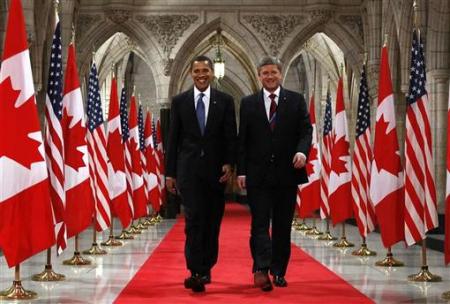 President Obama & PM Stephen Harper of Canada.
President Obama & PM Stephen Harper of Canada.
Many, yet, do not grasp the intrinsic connection between the economy, global financial Markets and foreign policy. If ever there were a great example of ‘Economic Foregin Policy’ at work, it was displayed today in President Obama’s first foreign trip to visit our northern neighbor, Canada. The primary focus of the President’s first official, diplomatic visit was the economic relationship between Canada and the U.S., and the North American Free Trade Agreement (NAFTA), a tri-lateral agreement governing the terms, structure and procedures of trade and economic cooperation between the three nations composing North America. The trip also focused on coordinating both the U.S. and the Canadian economic stimulus and recovery plans, renewable energy programs and global security challenges.
Notably accompanying the President were, among others, Larry Summers, the chairman of the National Economic Council; and Dennis McDonough, Director of the National Security Council — which recently issued an edict stating that ‘Economic Security’ was among the top three security threats facing the U.S.
Precisely speaking, United States ‘economic foreign policy’ has two major functions. First, to nuture, facilitate and advance a “free-market economy” and American private enterprise; and next, to promote, project and protect America’s trade, commerce, business and economic security interests abroad.
Next to national security, economic security is perhaps the single most important issue facing America today. In fact, the National Security Agency, in it’s 2009 Estimate, ranked the risks to the American economy as one of the top three national security risks facing the nation. While economics is often considered a domestic policy issue, the importance of American economic interests in driving U.S. foreign policy should not be overlooked, nor underestimated. With the emergence of an increasingly complex, transnational and interrelated global economy, America’s economic hegemony has been challenged by rising powers, as well as by more coordinated European allies. Today, economic policy revolves around developing cohesive strategies designed to augment our ability to remain globally competitive in the face of the emergent economies of India, China, Brazil and, sometimes, Russia.
One recent example of ‘Economic Foreign Policy’ is the 1994 North American Free Trade Agreement (NAFTA) between the United States, Canada, and Mexico. It was the most ambitious Economic Foreign Policy initiative since the Marshall Plan. Despite some well-placed criticisms, it has since become the sine qua non of spurred economic growth on the North American continent, creating a free trade zone comprising of all three nations. Well received, for the most part, by the business sector, this groundbreaking and controversial economic pact, helped to displace jobs out of the U.S. and has contributed to lowering or stagnating U.S. wages. This has had a direct impact the decline of the U.S. dollar; on spending by American consumers — the largest component of U.S GDP; as well as impacting America’s economic standing in the world. Yes, Economic Foreign Policy matters greatly.